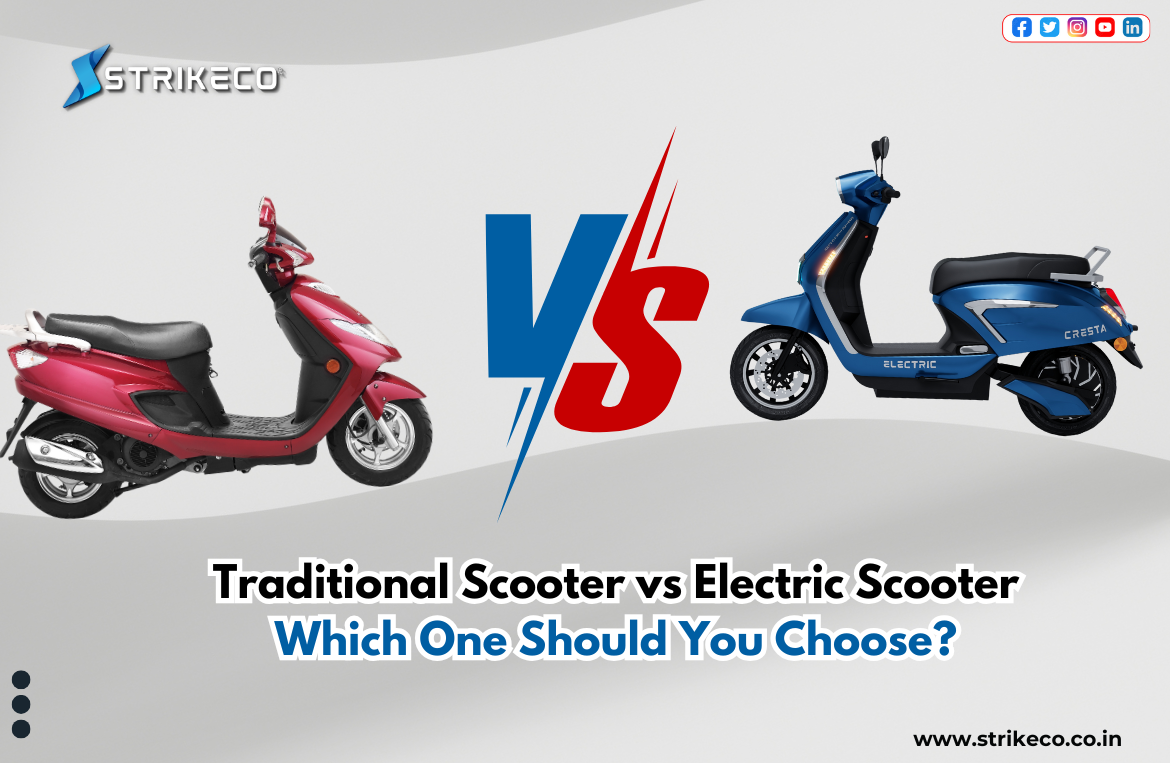
The ongoing debate between electric scooters and traditional petrol scooters is becoming more relevant as urban landscapes and personal transportation needs evolve. With India witnessing a surge in environmental awareness and a push toward sustainable mobility, understanding the key differences between these two scooter types can help you make an informed decision. Let’s explore how they stack up in terms of cost, convenience, performance, and future-readiness.
The most noticeable difference between these scooters is their fuel source. Traditional scooters run on petrol, a fossil fuel that emits harmful gases like carbon dioxide and nitrogen oxides, contributing significantly to air pollution. This is a growing concern in cities like Delhi and Mumbai, where air quality indices are alarmingly high.
On the other hand, electric scooters in India are powered by rechargeable batteries, producing no direct emissions. This makes them a cleaner option, crucial for urban areas struggling with pollution. Transitioning to electric mobility could significantly reduce the carbon footprint and align with India’s climate goals. Additionally, electric scooters contribute to noise reduction, offering a quieter commuting experience.
If budget is a key concern, the operational costs of electric scooters make them highly appealing. Charging an electric scooter is significantly less expensive than fueling a petrol scooter. For instance, charging an electric vehicle battery typically costs a fraction of what you would pay for petrol.
Electric scooters also have fewer moving parts, leading to lower maintenance expenses. There’s no need for oil changes or extensive engine repairs, which are common in petrol scooters. While battery replacement can be expensive, this cost is often offset by the lower daily expenses over the scooter’s lifetime.
Conversely, petrol scooters incur higher maintenance costs and are subject to fluctuating fuel prices. The recurring costs of petrol and frequent servicing can strain your budget over time.
Traditional scooters generally have a lower upfront cost compared to electric scooters, making them more accessible for many buyers. However, government incentives and subsidies for electric vehicles in India, such as the FAME scheme, are narrowing the price gap, making electric scooters in India a more affordable option for many.
The ease of refueling is a major advantage of petrol scooters, as petrol stations are widely available across urban and rural areas. This accessibility is crucial for long-distance commuters.
Meanwhile, India’s charging infrastructure for electric scooters is improving, particularly in cities like Delhi, Bengaluru, and Mumbai. However, smaller towns and rural areas still face challenges. Electric scooters also require several hours to charge, although newer models with fast-charging capabilities are changing the game.
Electric scooters in India typically cover between 50 to 150 kilometers on a single charge, making them ideal for city commutes but less suitable for long-distance travel. Petrol scooters, with over 200 kilometers of range on a full tank, remain a practical choice for longer journeys.
For urban commuters, electric scooters are a perfect fit, offering adequate range for daily errands and office commutes. Their quiet operation is an added advantage in congested cities.
Traditional petrol scooters excel in terms of top speed and acceleration, making them suitable for highways and uneven terrains. They deliver a powerful and thrilling riding experience that many riders still prefer.
Electric scooters, while quieter and smoother, offer features like instant torque delivery, making them nimble and efficient for city navigation.
Electric scooters require minimal maintenance due to their simpler design. No oil changes or extensive engine checks are needed, and features like regenerative braking systems reduce wear and tear. However, battery health remains a key consideration.
Petrol scooters, while robust, demand regular servicing, including engine tuning and oil changes, which can increase their long-term cost.
India is gearing up for widespread electric vehicle adoption, with the government focusing on subsidies, tax benefits, and improved charging infrastructure. As battery technology advances, electric scooters in India are becoming more competitive with petrol scooters in terms of range and affordability.
Your decision ultimately depends on your commuting needs, environmental concerns, and budget. For long distances, petrol scooters may still be the better choice. However, for urban commuters seeking lower operational costs and a cleaner, quieter ride, electric scooters are a compelling option.
As India moves toward a sustainable future, electric scooters are paving the way for responsible mobility. Whether it’s cost savings or environmental benefits, the shift to electric mobility is a trend that’s here to stay.